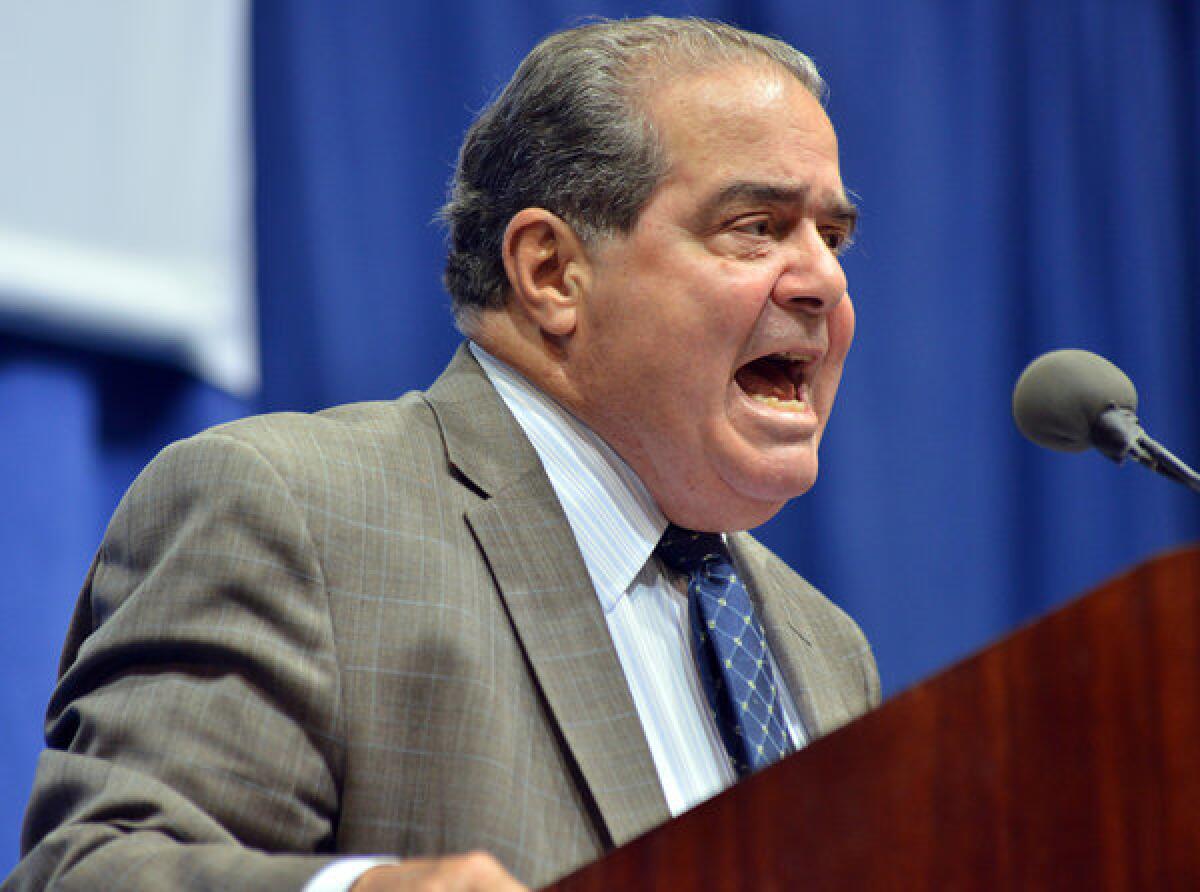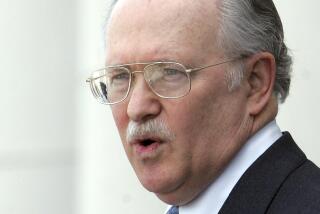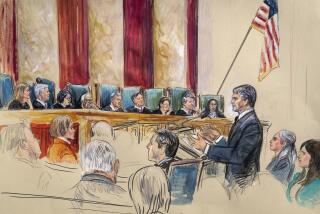Does Justice Antonin Scalia believe in the devil? You bet

WASHINGTON — Justice Antonin Scalia earned his reputation as the Supreme Court’s most outspoken conservative with sharp one-liners in his opinions and sarcastic cracks in the courtroom.
When a government lawyer defending campaign funding laws raised the specter this week of million-dollar checks flowing to congressional campaigns, Scalia was unmoved. “I don’t think $3.5 million is a heck of a lot of money,” he said, since billions are spent on national campaigns.
This week, he also sounded off on the pope, the devil and the Gipper as well homosexuals, as he referred to them, and the “shrilly liberal” news media. In an interview with Jennifer Senior of New York magazine, Scalia also spoke of his favorite opinions, his best sparring partner on the court and his slow success in winning respect for his philosophy of interpreting the Constitution based on its original meaning.
So, as a devoted Roman Catholic, what does he think of the new pope and his call for less focus on divisive issues such as abortion?
PHOTOS: 2013’s memorable political moments
“He’s the Vicar of Christ. He’s the chief. I don’t run down the pope,” Scalia said. “I think he’s absolutely right. I think the church ought to be more expansive.”
Has he met gay men and women and “softened” his views on homosexuality?
“I have friends that I know, or very much suspect, are homosexual. Everybody does,” he said. “I don’t think I’ve softened. I don’t know what you mean by softened … I still think it’s Catholic teaching that it’s wrong. OK? But I don’t hate the people that engage in it.”
Does he really believe in the devil?
“Of course! Yeah, he’s a real person. That’s standard Catholic doctrine,” he said. “You are looking at me as though I’m weird. My God! Are you so out of touch with most of America, most of which believes in the devil?” Indeed, polls have consistently shown that 70% to 75% of Americans share Scalia’s belief.
Who does he blame for turning the annual State of the Union address into what he called a “childish spectacle” made for television?
“The Gipper may have been the one who started it,” he said, referring to President Reagan, who appointed Scalia to the court. “He’s the one who brought in people he would recognize in the audience, and … made it into a television spectacle. And once it becomes a television spectacle, it’s nothing serious.”
Where does he get his news?
Largely from talk radio, he said. “You know who my favorite is? My good friend Bill Bennett,” referring to the conservative commentator who served in the Reagan administration. He said he “usually skims” the Wall Street Journal and the Washington Times, but avoids the Washington Post and New York Times because they are “so shrilly, shrilly liberal.”
PHOTOS: The battle over Obamacare
Asked about his favorite opinion and best one-liner, Scalia pointed to his dissent in Morrison v. Olson, the 1988 decision that upheld the independent counsel law. In his dissent, he sought to explain the danger of creating an unelected and unaccountable prosecutor for crimes involving the White House.
“Frankly an issue of this sort will come before the Court clad, so to speak, in sheep’s clothing,” he began. “But this wolf comes as a wolf.”
While the decision upheld prosecutions against officials tied to Reagan, Scalia’s dissent was cited as prophetic by Democrats in the late 1990s, when President Clinton was investigated for five years by independent counsel Kenneth Starr.
Scalia said his favorite opening line came in an early opinion. “This case, involving legal requirements for the content and labeling of meat products such as frankfurters, affords a rare opportunity to explore simultaneously both parts of Bismarck’s aphorism that ‘No man should see how laws or sausages are made.’ ”
Asked about his favorite sparring partner, Scalia said it was “probably John Paul Stevens.”
“There are some justices who adopt a magisterial approach to a dissent,” he said. The late Chief Justice William “Rehnquist used to do it. Don’t even respond to the dissent. I’m not like that. I think you should give the dissenter the respect to respond to the points that he makes. And so did John Stevens. So he and I used to go back and forth almost endlessly.”
Asked about “originalism,” Scalia said it “is more respectable than it was” before 1990. He noted that when she was dean of Harvard Law School, Justice Elena Kagan hired “three originalists” on the faculty. “That’s amazing to me. What it means is that at least originalism is now regarded as a respectable approach to constitutional interpretation. It really wasn’t 20 years ago.”
At age 77, Scalia said he sometimes wonders if he has slowed down.
“I often worry when I go back and read one of my early opinions like Morrison v. Olson. I say, ‘God, that’s a good opinion. I’m not sure I could write as good an opinion today.’ You always wonder whether you’re losing your grip.”
But getting a grip on himself, he assured the interviewer he has no plans to retire. “I’ll know when I’m not hitting on all eight cylinders,” he said. A telltale sign will be “that I won’t enjoy it as much as I do. I think that’s the beginning of the end.”
Follow Politics Now on Twitter and Facebook
Twitter: @davidgsavage
More to Read
Start your day right
Sign up for Essential California for news, features and recommendations from the L.A. Times and beyond in your inbox six days a week.
You may occasionally receive promotional content from the Los Angeles Times.






